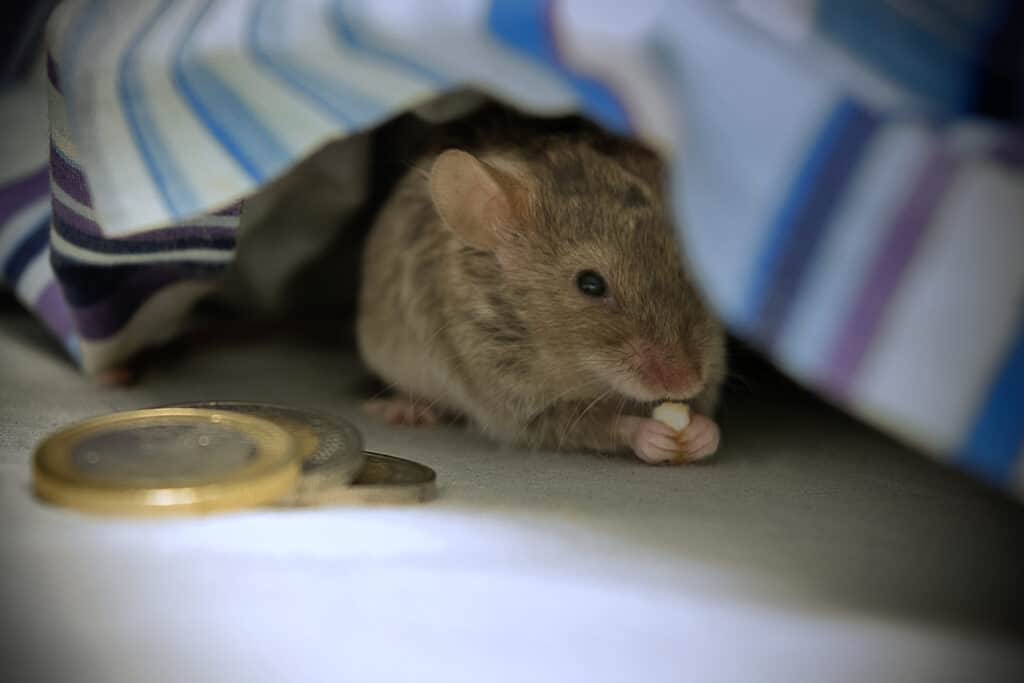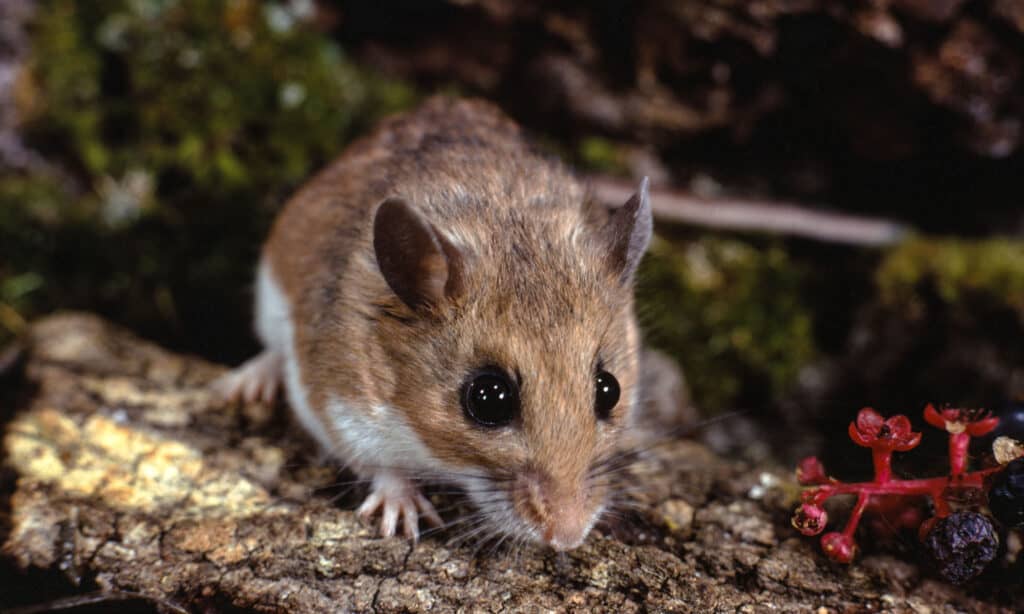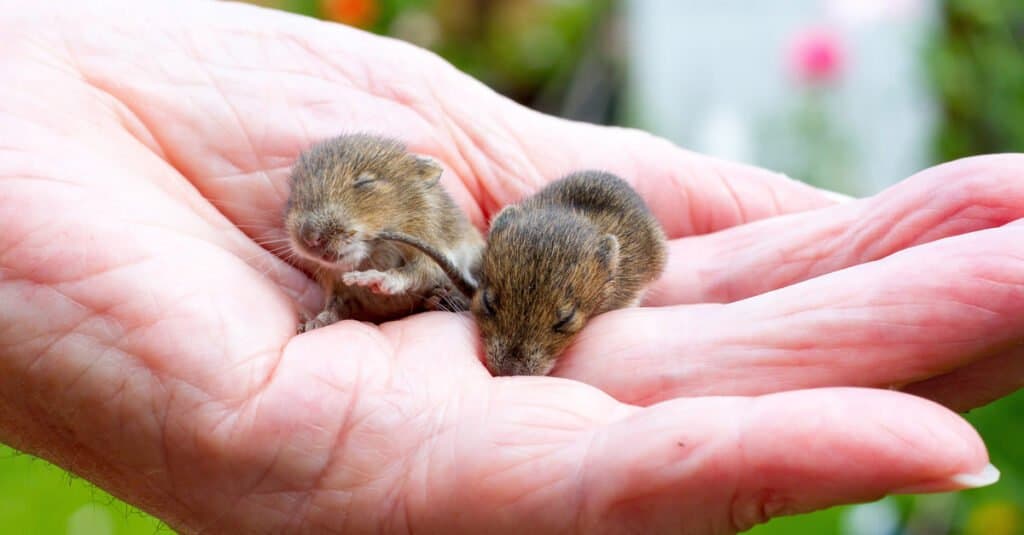Mice are very annoying pests that can cause many problems in your home. They can eat your food, scavenge bits of your linens for nests, and chew on your electrical wires. While all of those things are certainly aggravating, they’re not the only downside of having a mouse infestation. You have to consider a few concerning questions, like do mice carry rabies? Do they carry other diseases, too?
Today, we’re going to take a look at whether mice carry rabies and what other diseases they can transmit to you and your family members. More importantly, we’ll show you how they could transmit these ailments and what you can do to keep them out of your home.
Do Mice Carry Rabies?

Although they may seem cute, mice are often vectors of various diseases.
©iStock.com/Flore Sakowski
Mice do carry rabies. However, it’s exceedingly rare that they get rabies, and no case of mice transmitting rabies to humans has been recorded. That means the chances of you getting rabies from a mouse are incredibly low. That doesn’t mean you should handle wild mice or other wild mammals without protection and care, though.
Other small mammals, like raccoons and foxes, are more likely to carry rabies and transmit the disease to human beings.
If any of these creatures bite you, it’s a good idea to seek the medical advice of healthcare providers. That is especially true if the animals are exhibiting any signs of having rabies.
Signs of rabies include difficulty swallowing, excessive drooling, staggering, paralysis, fearfulness, aggression, and seizures. If your pet or a wild animal that you have encountered exhibits any of these signs, then you need to contact local animal control and seek medical care if you were bitten or scratched.
Rabies is a frightening disease. However, it’s not the only one you need to worry about when you encounter mice. Let’s take a closer look at some other diseases to consider.
What Other Diseases Do Mice Carry?

Mice are hosts for a wide variety of ailments.
©iStock.com/Weber
Mice carry various diseases that can pose a danger to humans, including hantavirus, hemorrhagic fever, plague, Lassa fever, tularemia, and more. These are all dangerous ailments that can cause painful infections or even death in some cases.
You’re not very likely to get any of the rarer diseases that mice carry, though you do need to be wary of them. Most of the time, you’re probably going to get a minor infection when a mouse bites you.
You should always clean and disinfect any wounds with hot water and soap. Next, you should put antibacterial cream on the wound and keep an eye on it. You need to seek medical attention for any bites or scratches if they show signs of infection.
How Do Mice Pass Diseases to Humans?

Most people are bitten by mice or get diseases by touching their urine or feces.
©RICHARD-ASQUITH/Shutterstock.com
Mice can pass diseases to other people in a variety of ways. Of course, the most frightening of these vectors for infection is bites. Mice do bite, and they can break the skin on humans with ease. Most people get bitten by mice because they are attempting to handle them. Mice are not rabid animals that will chase you down and deliver a bite.
In fact, aside from handling a mouse, the other most common reason that humans are bitten by mice is that they corner them and try to capture them. A cornered mouse is bound to be desperate. That means it will bite as a last resort because it doesn’t understand you just want to hold it.
Yet, bites are not the only means that mice pass diseases to humans. Mice can pass diseases to humans via handling, especially if humans come into contact with their urine, feces, or saliva.
That means you should always wear gloves when you are handling mice that make their way into your home. You also need to use gloves to handle materials that could have been contaminated by contact with mice. So, if you find a mouse nest, the first thing you need to do is put on gloves before you handle it. After that, it’s a good idea to find a way to safely burn the nest.
After you have disposed of the nest, you need to clean up all the feces and urine stains to prevent them from contaminating you with their diseases. As long as you are being safe, you should not contract any diseases from mice.
How Do You Get Rid of Mice?

Cats keep mice away, but you’re better off using traps and poison.
©Astrid Gast/Shutterstock.com
If you find signs that mice are in your home, then you need to be proactive about getting rid of them. Several methods exist for getting rid of mice in your home. Take a look at the most effective ways to get rid of a mouse infestation in your home.
Traps
Traps are the easiest and most efficient way to get rid of mice in your home. The most common mouse traps are spring traps. After a mouse activates it, a metal or plastic bar slams down and kills the mouse. From there, you have to put on gloves and dispose of the body along with the trap.
Glue traps catch mice and prevent them from moving, and disposing of the dead mice is as easy as throwing them away. Electrical traps zap mice as they step into a large, baited case.
You’ll also find humane traps. These allow you to catch and release mice if you want to leave them alive. Of course, you need to let them go carefully, so they don’t bite you or otherwise spread disease to you.
Poisons
Poison bait packs are a popular means to ensure mice die. Rodenticides are very effective because they are attractive to mice. If a mouse consumes enough of the product, then they die from internal bleeding. Sometimes, it takes multiple exposures to poison to finish off the mice.
Traps and poisons are the two most popular ways to eliminate mice in your home. Mice can continue to spread diseases after they have died. Make sure that you wear protective gear when you are cleaning up their bodies as well as when you’re cleaning up their nests, feces, and urine.
Now that we’ve answered, “do mice carry rabies?” you should feel confident enough to know what dangers these creatures pose. Be safe when handling wild mice and be vigilant about protecting yourself from harm.
The photo featured at the top of this post is © Paulpixs/Shutterstock.com
Thank you for reading! Have some feedback for us? Contact the AZ Animals editorial team.






